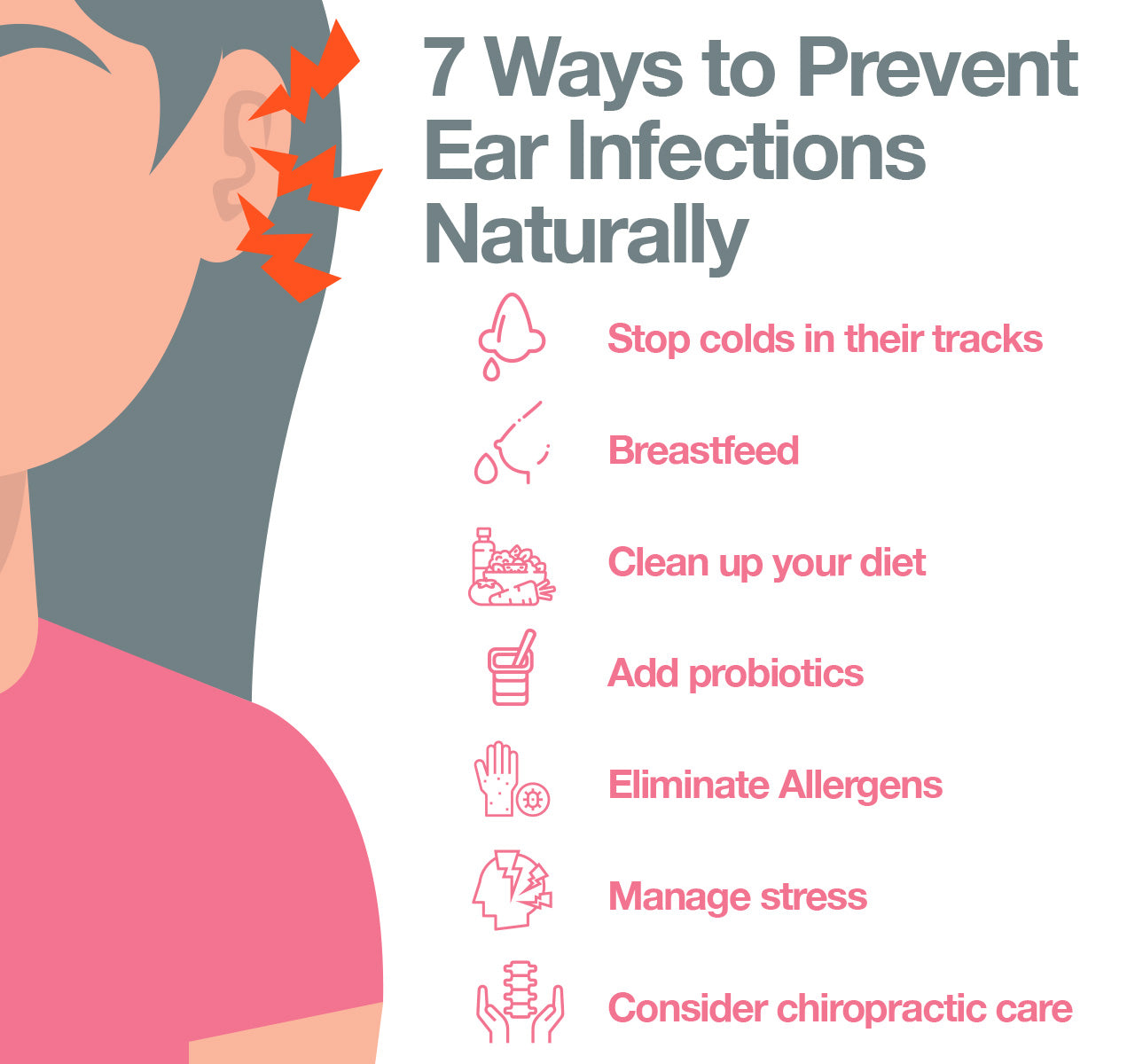How to Prevent Ear Infections Naturally and Avoid Antibiotic Resistance
 By: by Amino Science
By: by Amino Science

Many parents with young children learn to fear ear infections not only because they make kids (and parents) miserable but also because they can seem to clear up only to just as quickly return. And when you add to this the very real threat of antibiotic resistance, it’s no wonder the mere thought of an ear infection can drive a parent to distraction. So if you’re dealing with what seems like one ear infection after another, come with us as we explore how to prevent ear infections naturally and break the cycle of never-ending antibiotics.
What Are Ear Infections?
Ear infections, which are referred to as acute otitis media by most health care providers, occur when the air-filled cavity behind the eardrum known as the middle ear becomes inflamed due to fluid buildup. Ear infections are often seen following another illness—such as a cold or flu—that causes the eustachian tubes or adenoids to become swollen and blocked.
The eustachian tubes are the narrow tubes that run from the middle ear to the pharynx—the area in the back of the throat, behind the nose. When these tubes become congested, they can cause fluid to build up in the middle ear. This can be especially problematic in children, whose eustachian tubes are shorter, narrower, and more horizontal.
The adenoids are pads of lymphatic tissue located in the back of the throat, near the eustachian tubes. Since the adenoids are located close to the opening of the tubes, any swelling they undergo during the course of an illness can cause the eustachian tubes to become blocked.
While most ear infections are caused by the bacterium Streptococcus pneumoniae, viral infections can also lead to otitis media. Likewise, fluid can sometimes get trapped in the middle ear even after an infection has run its course. When this happens, it’s known as otitis media with effusion.
Many sources estimate that between 80% and 90% of children will have at least one ear infection by the time they turn 3 years old. Moreover, ear infections remain the number one reason parents take their children to the doctor.
However, the vast majority improve without antibiotic treatment, and the American Academy of Pediatrics (AAP) states that a period of watchful waiting—observing for resolution of uncomplicated infections over a period of 48 to 72 hours—could help reduce health care costs and improve outcomes.
Antibiotic Resistance
Despite at least one recent study pointing to a decline in cases of acute otitis media, ear infections continue to be a leading cause of medical care, antibiotic treatment, and surgery. And in spite of growing fears regarding antibiotic resistance and the rise of superbugs, the Centers for Disease Control and Prevention (CDC) continues to estimate that at least a third of all antibiotics prescribed in the United States are not needed.
When antibiotics are prescribed unnecessarily for treating ear infections and other common illnesses, we become more and more vulnerable to bacterial infections that can’t be eradicated by existing antibiotics. And the bacterium most likely to cause ear infections is no exception, as strains of S. pneumoniae are becoming more resistant to available antibiotics. Disturbingly, this trend is continuing to grow.
Moreover, studies have shown that the overuse of antibiotics can permanently alter the balance of good and bad bacteria in our digestive tracts. In fact, a recent study found that exposure to multiple rounds of antibiotics can lead to decreased diversity of beneficial bacterial species as well as colonization by potentially undesirable bacteria.
This disruption of the gut microbiome can result in a weakened immune system and a self-perpetuating cycle of infection and further antibiotic exposure.

How to Prevent Ear Infections Naturally
The good news is that it’s possible to prevent ear infections from happening in the first place and thus get off the merry-go-round and avoid the negative side effects antibiotic overuse entails. Some of the best techniques out there include:
- Preventing colds
- Breastfeeding
- Eating a proper diet
- Using probiotics
- Eliminating allergens
- Managing stress
- Trying chiropractic care
Stop Colds in Their Tracks
As mentioned, ear infections are often brought on by congestion due to colds and flu. So to help protect you and your child from infections, it’s a good idea to practice good hygiene, such as washing your hands frequently and avoiding eating or drinking after others.
In addition, boosting the immune system with proper nutrition and supplements can go a long way toward decreasing the risk of ear infections. For example, natural remedies such as echinacea, vitamin D, vitamins B6 and B12, vitamin C, zinc, elderberry, astragalus, and the amino acid N-acetylcysteine (NAC) are all known to be beneficial in supporting the immune system.
Breastfeed
Breast milk supplies a growing infant with antibodies that help build its immune system and protect against disease, and studies show that babies who are breastfed have fewer ear infections than children who are fed formula. In fact, the AAP recommends that babies be exclusively breastfed for the first 6 months of life, and that breastfeeding continue to complement solid food up to at least 1 year of age.
Clean Up Your Diet
When it comes to building your immune system, dairy and sugar are not your friends. Not only do dairy products encourage mucus production, but sugar also weakens the immune system and feeds bacteria—a perfect recipe for ear infections. It’s a good idea to eliminate high-fat and processed foods as well, as these unhealthy options have also been shown to lead to chronic inflammation.
Instead, ramp up your infection-fighting ability with anti-inflammatory foods like fresh fruits and green leafy vegetables, whole grains, lean proteins, and healthy fats, such as coconut oil and olive oil. It's also a good idea to supplement with the building blocks of protein, essential amino acids, to support overall wellness and immunity.
Add Probiotics
Antibiotics, stress, and poor diet can all disrupt the balance of good and bad bacteria in the gut. And, as we already discussed, this can have a detrimental effect on the immune system. However, the beneficial bacteria found in probiotics can help correct this imbalance by boosting numbers of good bacteria—and studies show this can prevent infections. Probiotics from yogurt, fermented foods, and oral supplements can all be effective in supporting gut health.
Eliminate Allergens
Unfortunately, we’re surrounded by toxins and allergens that can affect our overall health. Mold, pollen, smoke, air pollution, food additives, and household chemicals can all trigger an immune response. And this can lead not only to itching of the middle and outer ear but also to buildup of fluid in the sinuses and middle ear infections.
So it’s important to decrease your exposure to as many potential allergens as possible. This includes wood stoves and fireplaces, which have been linked to an increased risk of both upper respiratory infections and ear infections.
Manage Stress
Whether you’re an adult with chronic ear infections or have young children who are frequently ill, it’s a fact of life that both adults and children experience stress. And stress affects the immune system. So support your immune system with techniques like deep breathing, meditation, and yoga—or get out in the fresh air and take a walk.
Not only are stress reduction methods proven to benefit the immune system, but sharing these techniques with your children can also teach them powerful coping strategies they can carry with them through the rest of their lives.
Consider Chiropractic Care
Believe it or not, chiropractic adjustments have been shown in several studies to help prevent and treat ear infections. In fact, a 1996 study investigating the use of chiropractic care for ear infections in children aged 5 and under found that chiropractic adjustments were effective in 93% of cases. And another study found a strong correlation between chiropractic adjustments and resolution of ear infections in children.
With the right preventative measures, you can help keep ear infections at bay and even eliminate them from your life altogether. And instituting just a few of the techniques listed here may not only stave off antibiotic resistance but may also help reduce the risk of complications from recurrent infections—including hearing loss and eardrum perforation.
However, there are times when professional medical care is necessary. So if you have a child who is less than 6 months old and is experiencing symptoms of an ear infection, or your child isn’t being helped by over-the-counter home remedies and is having symptoms such as extreme ear pain, high fever, or discharge from the ear canal, don’t hesitate to see your health care provider right away.

Up to 25% off Amino
Shop NowTAGS: conditions natural cures
Join the Community
Comments (0)
Most Craveable Recipes




 833-264-6620
833-264-6620



















